

A new hierarchy. Promise Phelon (The Phelon Group) sent over a white paper her firm recently did about a new hierarchy based on Maslow's famous self-actualization pyramid.
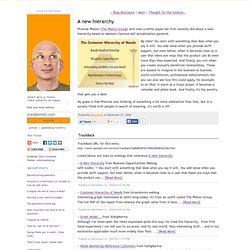
My take? You start with something that does what you say it will. You add value when you provide swift support, but even better, when it becomes clear to a user that there are ways that the product can do even more than they expected. And finally, you win when you create mutually beneficial relationships. These are easiest to imagine in the business to business world (conferences, professional advancement) but you can also see how this could apply, for example, to an iPod. The $400 model car. A giant step (backward) Today's Wall Street Journal features an article by Stacy Forster about marketers trying to "polish spam's rusty image.
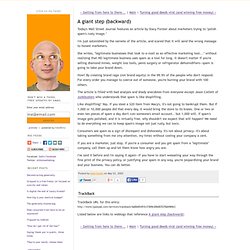
" I'm just astonished by the naivete of the article, and scared that it will send the wrong message to honest marketers. She writes, "legitimate businesses that look to e-mail as an effective marketing tool... " without realizing that NO legitimate business uses spam as a tool for long. It doesn't matter if you're selling diamond mines, weight loss tools, penis surgery or refrigerator dehumidifiers--spam is going to take your brand down. How? By creating brand rage (not brand equity) in the 99.9% of the people who don't respond. It's not a cow if I don't think it's a cow. The Curse of Great Expectations. I can benchmark everything now.
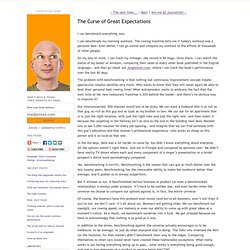
I can benchmark my morning workout. The rowing machine tells me if today’s workout was a personal best. Even better, I can go online and compare my workout to the efforts of thousands of other people. On my way to work, I can track my mileage. (My record is 89 mpg). The problem with benchmarking is that nothing but continuous improvement (except maybe spectacular results) satisfies very much. Our interconnected, 500-channel world lets us be picky. In the old days, data was a lot harder to come by. Some people still don't get the permission thing. I was listening to WNYC radio yesterday, and they were talking about the California ban on spam (mostly a full-employment bill on behalf of lawyers, but every little bit helps.)
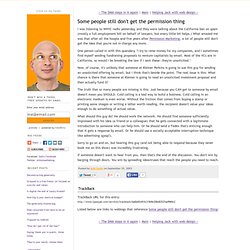
What amazed me was that after all the hoopla and five years after Permission Marketing, a lot of people still don't get the idea that you're not in charge any more. One person called in with this quandary, "I try to raise money for my companies, and I sometimes find myself sending fundraising proposals to venture capitalists by email. Most of the VCs are in California, so would I be breaking the law if I sent these--they're unsolicited. " Now, of course, it's unlikely that someone at Kleiner Perkins is going to sue this guy for sending an unsolicited offering by email, but I think that's beside the point. The real issue is this: What chance is there that someone at Kleiner is going to read an unsolicited investment proposal and then actually fund it? Some people still don't get the permission thing.
Pay you a nickel? So, how did a chocolate bar turn into a Purple Cow? Scharffen Berger doesn’t have a chance.
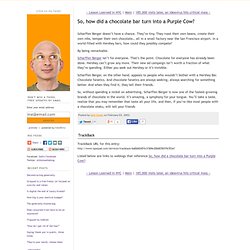
They’re tiny. They roast their own beans, create their own nibs, temper their own chocolate… all in a small factory near the San Francisco airport. In a world filled with Hershey bars, how could they possibly compete? By being remarkable. Scharffen Berger isn’t for everyone. Scharffen Berger, on the other hand, appeals to people who wouldn’t bother with a Hershey Bar. So, without spending a nickel on advertising, Scharffen Berger is now one of the fastest-growing brands of chocolate in the world. Marketing plan for a marketing book. Loyal readers will remember that I used permission marketing techniques to market my book Permission Marketing.
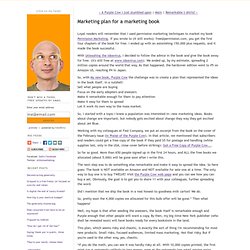
If you wrote to (it still works): free@permission.com, you get the first four chapters of the book for free. I ended up with an astonishing 150,000 plus requests, and it made the book successful. With Unleashing the Ideavirus, I decided to follow the advice in the book and give the book away for free. Been thinking about online dating. No, not doing it.
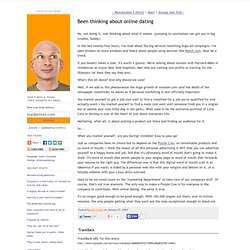
Just thinking about what it means. (jumping to conclusions can get you in big trouble, buddy). In the last twenty-four hours, I've read about the big services launching huge ad campaigns, I've seen stickers on store windows and heard about people using services like Match.com. Must be a trend. When people become cogs. The cornerstone of the industrial revolution was the simple idea that management could dramatically increase productivity by buying machines that did what they were told, were cheap and could scale.
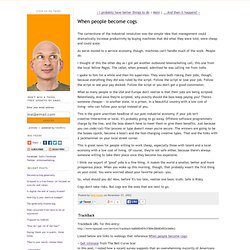
As we've moved to a service economy, though, machines can't handle much of the work. People do. I thought of this the other day as I got yet another outbound telemarketing call, this one from the local Yellow Pages. The caller, when pressed, admitted he was calling me from India. I spoke to him for a while and then his supervisor. Lesson Learned in NYC. Where are the optimists?